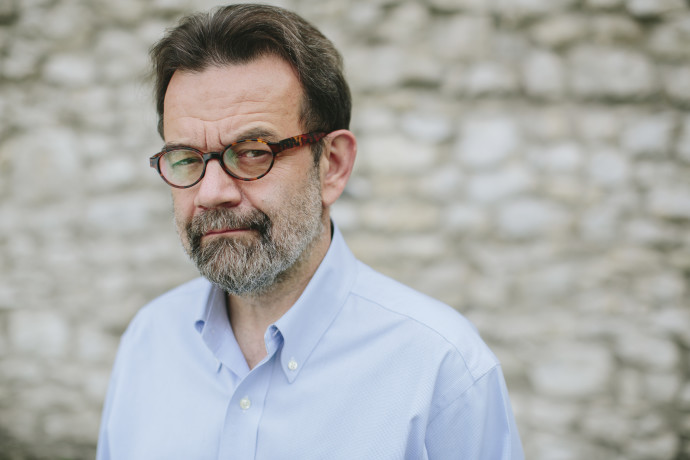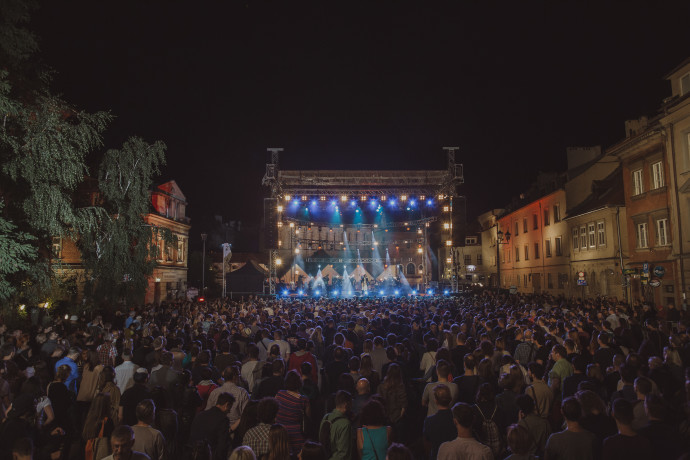Janusz Makuch is irrepressible, inspirational, warm and engaging. He peppers his speech with Hebrew expressions, from rega (“just a minute”) to yalla (“let’s go”). He is well versed in cantorial music, and he singlehandedly returned Jewish culture to Krakow as the president and founder of the city’s annual Jewish Culture Festival, which attracts thousands of visitors every summer.
There’s just one minor detail – Makuch is not Jewish. He explains the complicated relationship between his early Catholic upbringing and his love for Israel and the Jewish people by exclaiming, “Well, you can call me a Shabbos goy, if you want. But most important – I am a Polish Zionist, and I am proud of it!”
Recently, Makuch entertained this writer during a recent visit to Israel in a fascinating one-hour discussion, explaining how he has come to devote his entire adult life to perpetuating and popularizing Jewish culture through the Culture Festival, which has been held since 1988.

“I discovered the Jewish ‘Atlantis’ when I was 15,” says Makuch, who was born in the city of Puławy, in eastern Poland, in 1960. “I knew nothing about the Jews who lived for almost 1,000 years in my country.”
As a teen, Makuch was interested in history and was shocked to learn that the Jews were murdered during the Holocaust. “I was taught that all of the victims of Auschwitz were Polish citizens,” he says. “No one mentioned the Jews.”
Makuch gradually learned more about the thousand-year history of the Jews in Poland, their significant contributions to Polish society, and the tragic events of the Holocaust.
In 1980, 20-year-old Janusz left his home to study in Krakow. He recalls a Friday evening in October when he came across a small building behind the synagogue where a light was burning in the window. It was the beit midrash, the local house of Torah study.
“I knocked on the door,” says Makuch, “and I said to the man who opened the door, ‘May I come in?’ He replied to me in Yiddish and said, ‘Come in.’ For me, this was an invitation to the Jewish world.”
Makuch began to frequent the house of study and spent time praying with the people there, who treated him with kindness and friendship, despite their religious differences.
He spent a great deal of time in the Kazimierz district of Krakow, which was a center of Jewish life between the 15th and 17th centuries. The Oppidum Judaeorum, the Jewish City, was the spiritual and cultural center of Polish Jewry. Today, Kazimierz is one of the liveliest sections of Krakow. “Even though I am not Jewish,” he declares, “I have inherited this Jewish legacy.”
To commemorate the legacy of Jewish life in Poland, Makuch thought it was necessary to translate the fascination and love that he held for Jewish life in Poland into something practical. “How can we – Jews and non-Jews alike – commemorate Jewish life here?” he asks rhetorically. “Six years of the Shoah cannot eclipse 1,000 years of vibrant Jewish life and culture.” So in 1988 Makuch decided to organize a Jewish Culture Festival in Krakow.
“It was a crazy time,” he recalls. “The Communist regime still ruled Poland. The festival I organized as a 28-year-old was a bit ‘underground’ in the beginning.”
Approximately 100 people attended the first Jewish Culture Festival, and Makuch did not plan on holding it the following year. But with the fall of the Berlin Wall in 1989 and the dissolution of the USSR, Makuch made the event into an annual happening.

When he finally received his passport, he traveled to Israel for the first time to invite Israeli musicians to add a new flavor to his nascent festival and to simply experience the beauty of the Land of Israel. Makuch invited musicians such as Shlomo Bar and Habrera Hativeet, an Israeli world fusion band; and Chava Alberstein, the well-known Israeli musician and composer, to expand the festival’s horizons.
Soon, the sounds of Yiddish, Hebrew and Arabic were heard from the stage in Krakow. The festival became more popular and began to attract visitors from around the world. Today, Makuch travels to Israel several times a year to enjoy Jerusalem – “I can’t live without Jerusalem” – and locate talent for the festival.
“The Jewish Culture Festival is not a random collection of cultural events,” he explains. “It is a never-ending educational process aimed at the systematic mental transformation of Poles, Jews and people of goodwill.”
Undoubtedly, the festival’s location, in the shadows of the Auschwitz-Birkenau death camps, lends a sense of meaning and purpose to the events. “I understand where I am,” he says. “I don’t believe in reconciliation, and I don’t believe in the empty slogan ‘Never Again.’ Nobody has the right to forgive on behalf of those murdered during the war, let alone those after the war. Even more so, none of us Poles has the right to expect such forgiveness. We are prisoners of memory. A.B. Yehoshua was right – we need “amnesia” to escape the shadow of ubiquitous death. Do you think this is possible?”
The festival is a never-ending educational process aimed at the systematic mental transformation of Poles, Jews and people of goodwill
JANUSZ MAKUCH
Quoting the late Rabbi Jonathan Sacks, he says quietly, “The hate that begins with Jews never ends with Jews. Nowadays, who would dare to say, ‘Never Again?’”
Despite the unavoidable encounter with the events of the Holocaust, Makuch insists that the festival is not just about the past. Rather, he explains, the musicians and scholars at the festival use the past as a source of inspiration for the future.
Today, the Jewish Culture Festival attracts an audience of 30,000 people each year, and in the spirit of using the past as inspiration for the future, it opens with a cantorial performance. Some of the most famous names in cantorial music, such as Yitzchak Meir Helfgot, Benzion Miller, Yaakov Lemmer, Yaakov Motzen, and many others covering the entire spectrum of Israeli music, have graced the festival stage. “If you want to send a message to the people,” says Makuch, “you have to send a message from the highest artistic level.”
Beyond the music, says Makuch, the festival also concentrates on Judaism. Every year, the festival includes rabbis who deliver lectures about basic Jewish principles. Noting that the majority of the attendees at the festival are not Jewish, Makuch says, “Most of the festival’s audience are Poles, including Catholics. They will never understand Christianity if they first don’t understand Judaism.”
Makuch notes that there can be as many as 15,000 people at one time on Szeroka Street, where the festival’s huge stage is arranged, for one of the festival’s many concerts. Musicians perform a wide variety of music, including Israeli, klezmer, jazz, hassidic, Moroccan, and Bukharan. “Basically, he says, “it is an Israeli festival because, for me, the center of Jewish life and Jewish culture is Israel.”
It is for this reason, he explains, that the Krakow Jewish Festival maintains a close relationship with the Israeli Embassy in Poland. “We have a great connection with them,” reports Makuch, mentioning that Israeli Ambassador Yacov Livne attended the festival earlier this year and was present at its Zachor ceremony commemorating the Holocaust.
When the Jewish Culture Festival began in Krakow in 1988, says Makuch, there were no official relations between Poland and Israel. Despite that, Makuch invited Mordechai Palzur, who was not yet officially the ambassador, to visit. Since then, he says, every Israeli ambassador to Poland has attended the festival.
Israel’s Foreign Ministry provides financial support to the festival, and as Makuch points out, “This is a pro-Israel festival. We are one of the only festivals that openly support Israeli life and culture.” In previous years, it has focused on Israeli themes, such as Zion and Jerusalem.
It is clear from our conversation that Makuch has a love and affinity for Judaism and the Jewish people. On Israel’s 70th anniversary, he received the Yakir Israel (Friend of Israel) award – the only Pole so honored. He frequently spends Jewish holidays, such as Purim and Simhat Torah, with his Jewish friends, such as writer Yossi Klein-Halevy. He admits with a smile, “I’m not a typical goy.”
Makuch is certain that the festival has served to strengthen ties between Poles and Jews, despite some of the recent diplomatic difficulties between the two countries. “We will never return to the world that was martyred, but we can build something new and real. Today, I am witnessing young Jews in Poland who finally openly identify and live as Jews.” They have Jewish community centers and a Hillel in Poland. There are many Jewish organizations there, though it is not on a large scale.”
Janusz Makuch has been trying to understand the Jewish part of his Polish identity since he was 15. Through his Jewish Culture Festival, he has reached a greater understanding of what Judaism means, and he says it is much more than a festival. It is a never-ending educational process.
This article was written in cooperation with the Foreign Affairs Ministry.
